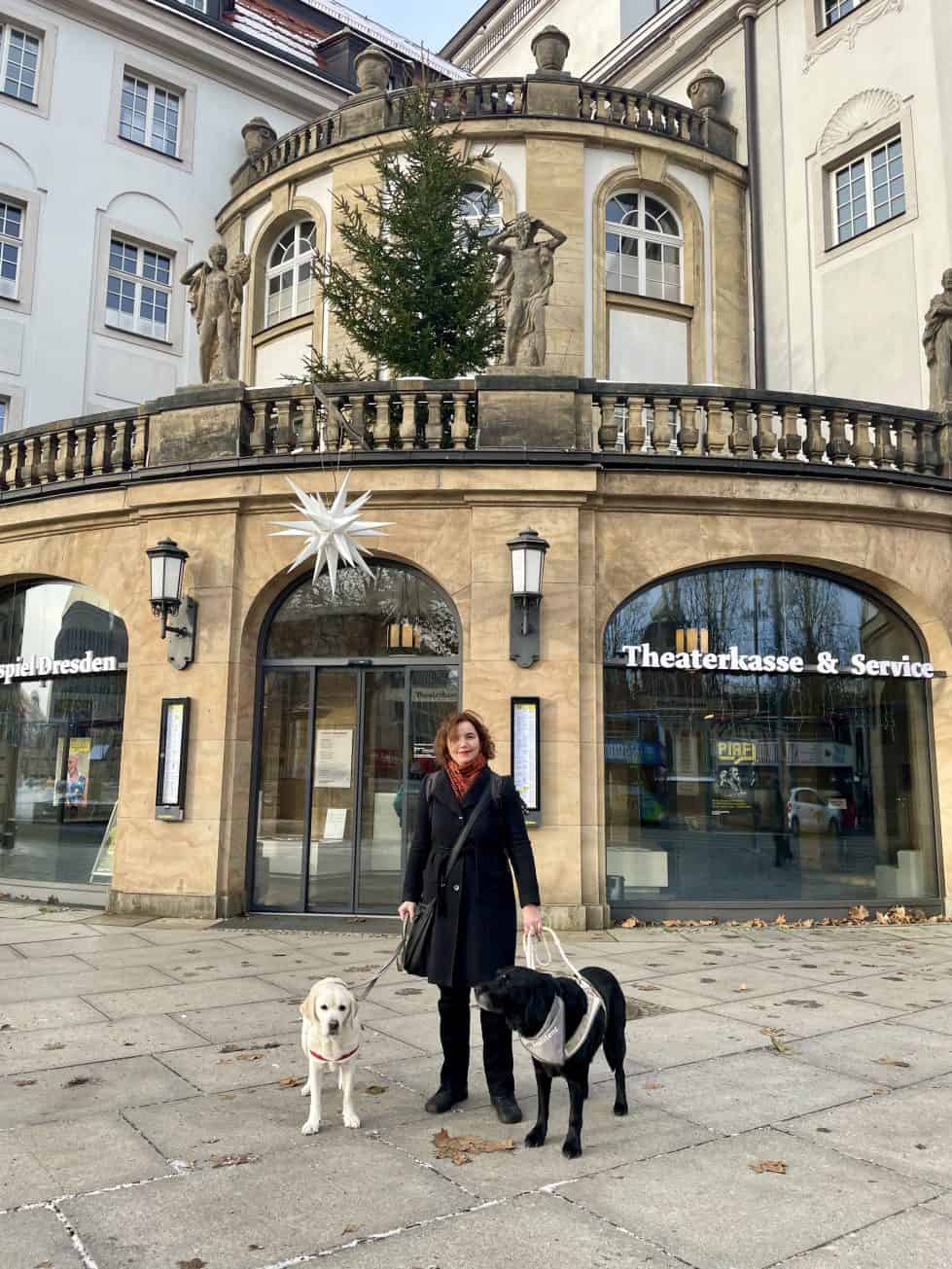A cornucopia of culture and chocolate
Dresden started in October with a press conference at the Leuben Citizens’ Office and declared itself assistance dog-friendly. The city undertook to provide public facilities with the sticker “Assistance dog welcome” and changed the house rules by clarifying that the general dog ban does not apply to assistance dogs. There was a lively exchange of information between all those present. The “Morgenpost”, Sachsenfernsehen, Radio Dresden and the press office of the city of Dresden reported on the event.
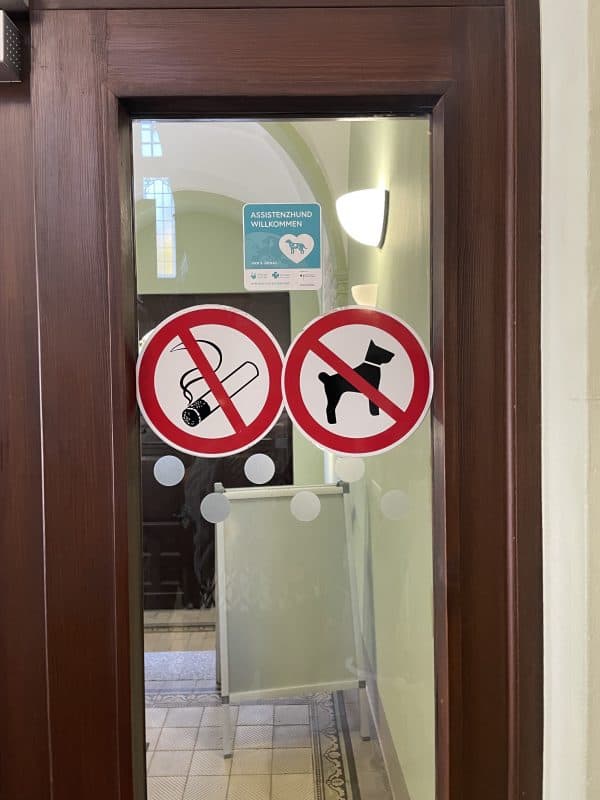
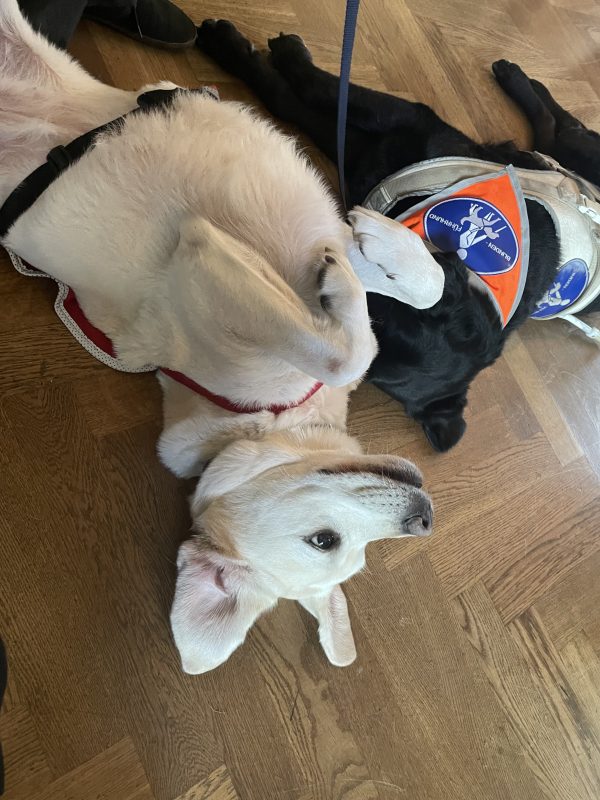
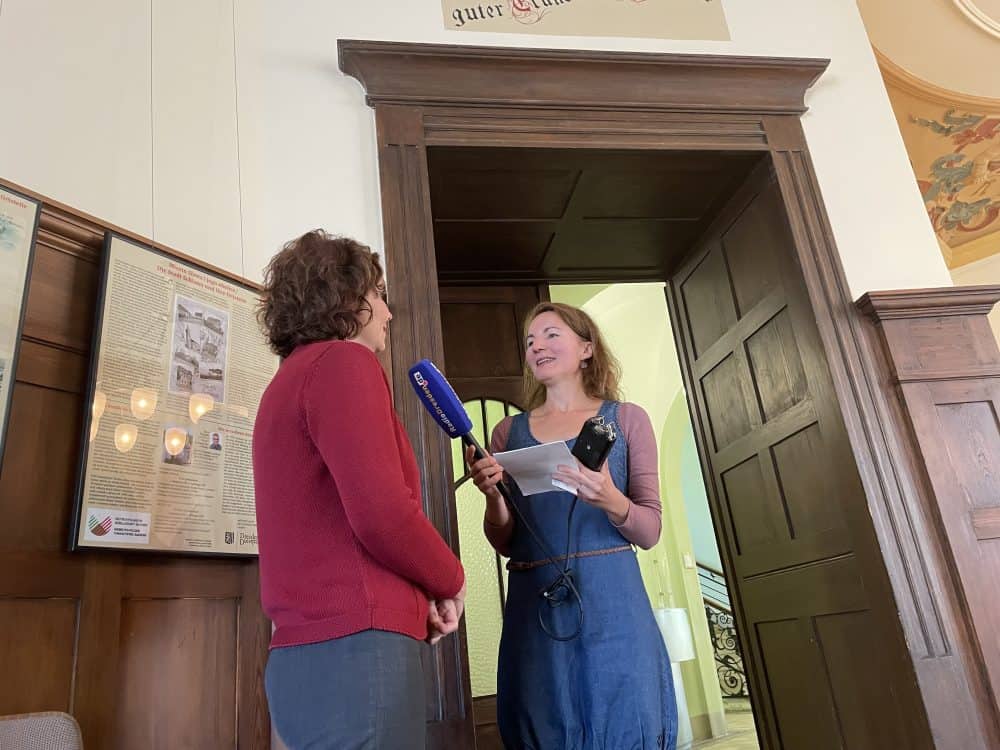
We tested Dresden’s old town for assistance dog friendliness as far as our paws and feet would carry us in the sunny fall weather. At the entrance to the Frauenkirche, there was brief confusion as to who was actually blind and/or disabled. It was a funny situation and probably had less to do with the assistance dogs than with the fact that our disability was not immediately obvious. There was no barrier to entry.
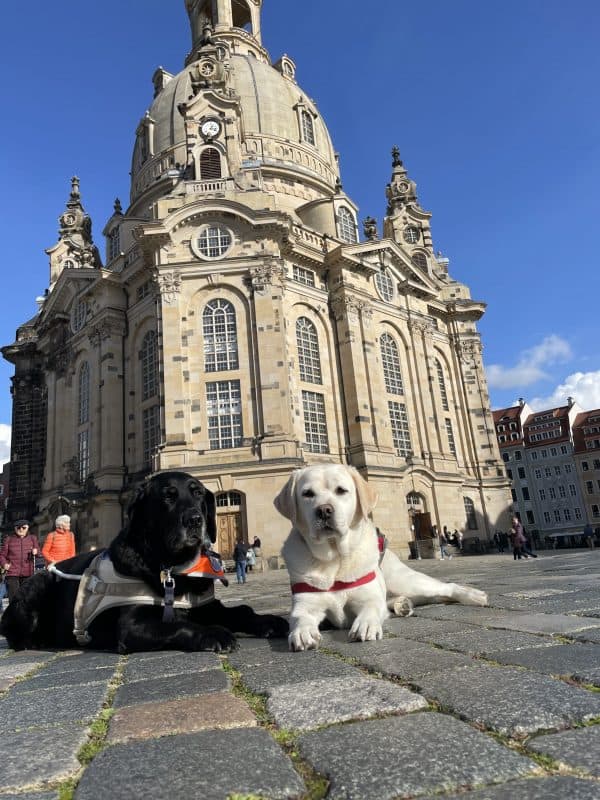
We decided to visit the Chocolate Museum because we suspected it had special hygiene requirements. In fact, the no dogs sign immediately caught my eye. We entered the store from where we went into the museum. A member of staff took a breath, looked at our two assistance dogs, exhaled and then explained to the staff that these dogs were allowed in after all. Then we experienced very friendly staff. Help was offered unobtrusively, which we gratefully accepted. The museum is definitely worth a visit. Later, we explain to the boss why we are in the city and how well the museum would have worked with access. Together we put the “Assistance dog welcome” sticker next to the no dogs sign.
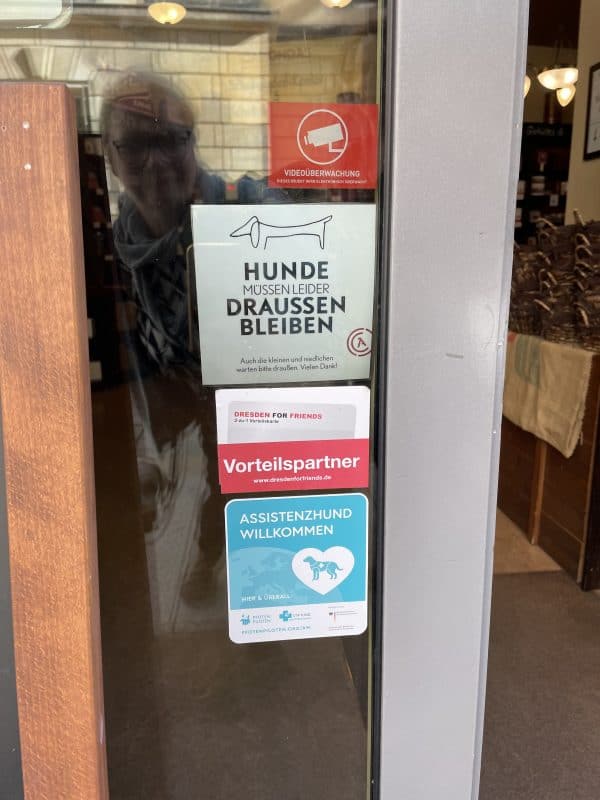
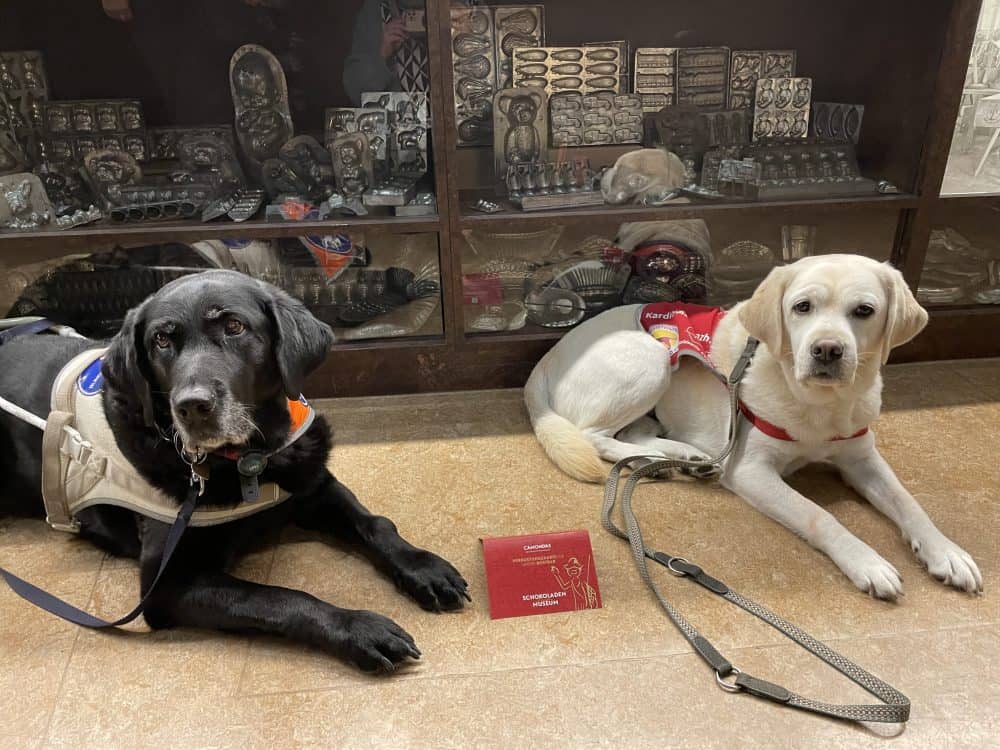
In the evening, we had an appointment with the head of DEHOGA Saxony, Axel Klein, at the Maritim Dresden, a listed warehouse with open hospitality. Yes, we were very concerned about the problem of access to hotels and restaurants. Mr. Klein gave us a positive lift with his energy, focused on education, offered his reach to support our access campaign and brought his creative team with him. We gratefully accepted the offer. When we set off late that evening, we were filled with plans and ideas. And when we left, the waitress gave us the best compliment: “You really don’t notice the dogs at all.”
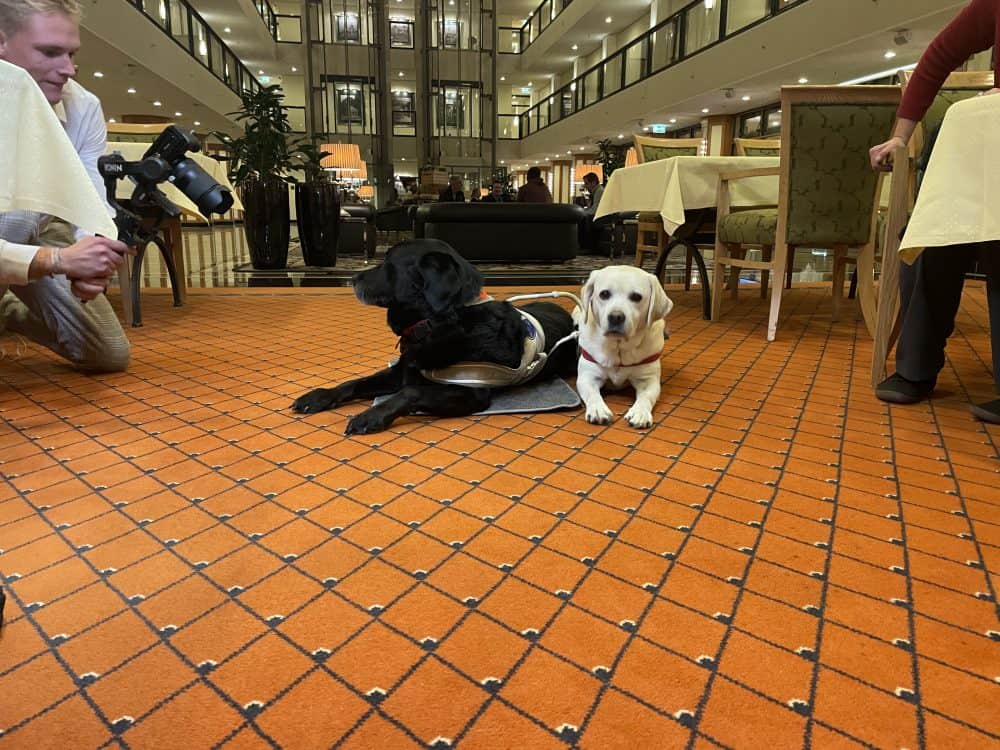
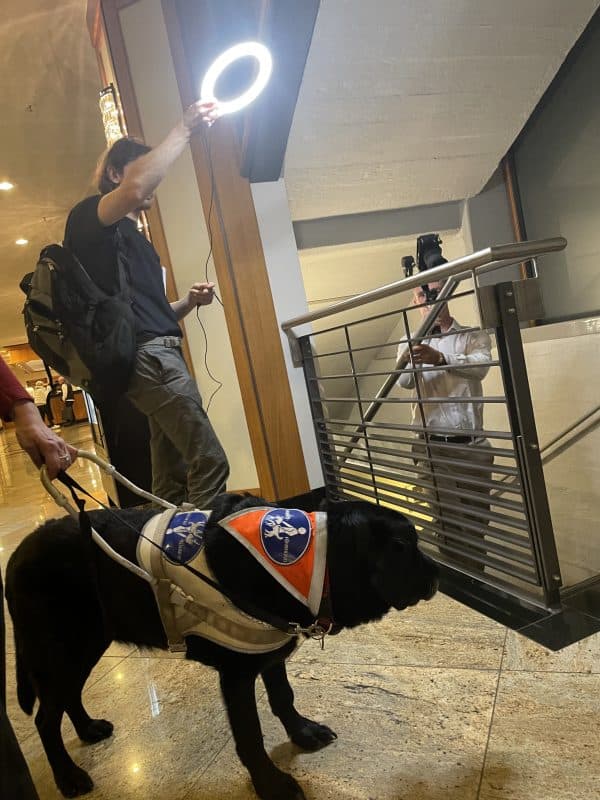
We weren’t able to attend all the important meetings in October, but we didn’t want to miss them either and decided that we would come back. The issue was too important to us. So we returned at the beginning of December.

At the Staatsschauspiel Dresden, we have an appointment with Ms. Fuchs, Head of Theatre Education, and Ms. Blech, Head of Public Relations. The fact that assistance dog teams are allowed into the theater is not the issue here. It’s more about which places might be suitable, how you can recognize an assistance dog and what assistance dogs are actually available. The sticker will also be displayed for all to see at the Staatsschauspiel and we promise that we will come to a performance at some point. And we really do check the calendars in the evening because we feel so much like culture when we are welcome and there is no barrier to entry to overcome.
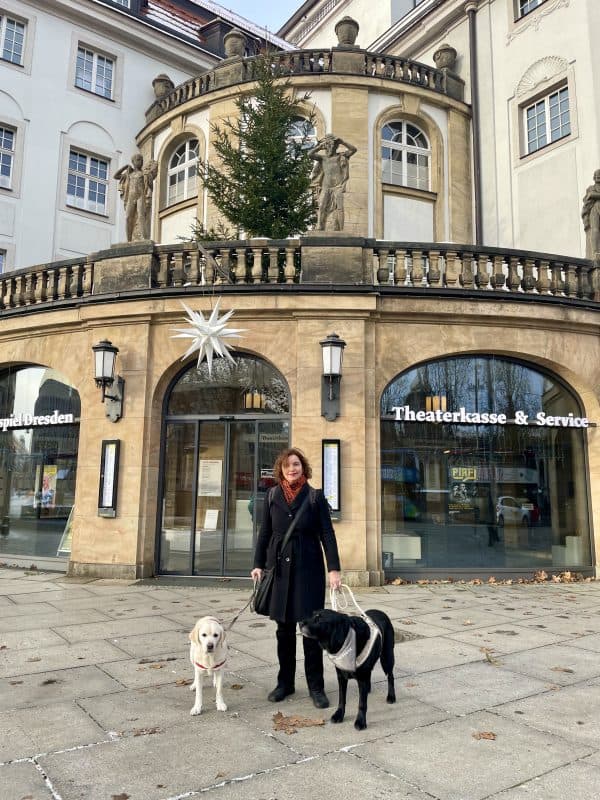
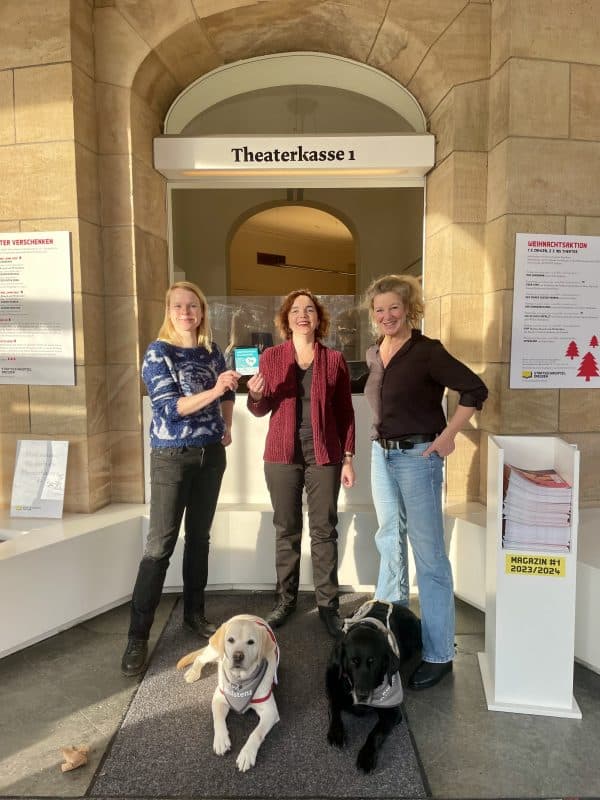
In the afternoon, an icy December wind blows around our ears as we set off for the Semperoper. Our aim is to listen to concerns, dispel them and create a feeling of welcome. We have an appointment with Mr. Wollmann at the stage entrance. Together we go into the beautiful historic building and meet Johann Casimir Eule (Chief Dramaturg and Deputy Artistic Director), Jan Seeger (Technical Director), Stefan Wollmann (Head of Communications and Marketing), Oliver Bernau (Press Officer Opera and Ballet) and Heike Jensen (Head of Admissions). First of all, we explain why we are there and that the law is one thing, and educating and talking to each other is another. Again, it’s about how to recognize an assistance dog, what different assistance dogs there are and which seat might be suitable. But it’s also about animal welfare issues: what’s too loud, what’s too long, where can the assistance dog go about its business during the break, etc. It is a very pleasant conversation with mutual respect and appreciation. The Semperoper notes particular volume levels, banging noises etc. on its website.
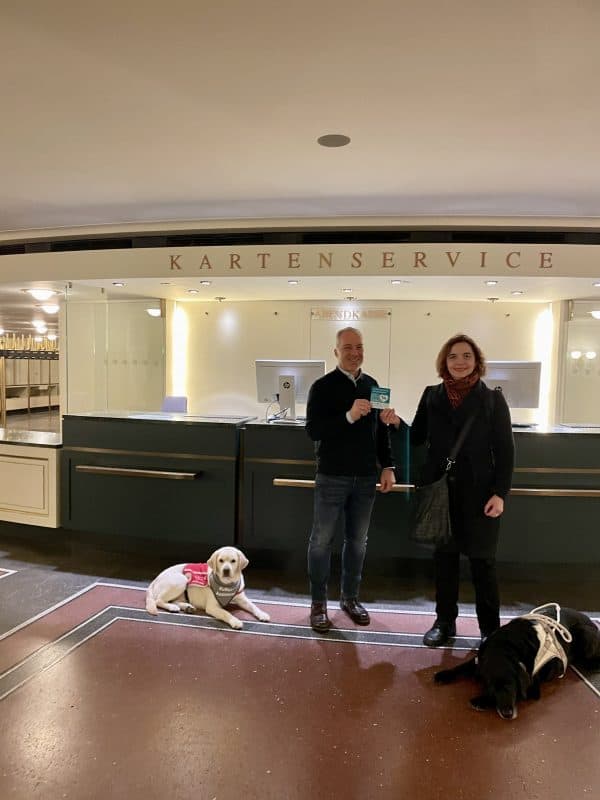
We ask people with assistance dogs to obtain detailed information about this and to realistically assess whether their assistance dog can accept this in a relaxed manner. Dogs also appear on stage in some of the plays. The fact that Masha and Daika demonstrate what an assistance dog is all about (being completely unobtrusive and focused on the human partner) is the argument that counts the most in the end. These dogs don’t mix up a performance and don’t disturb anyone. They do their work and rest within themselves. They are not stressed and not overwhelmed. And we owners are most concerned about their protection and welfare. By the time we leave the opera, it is already dusk. It’s even colder now, but we forget to put our hats on because we’re so happy. The Semperoper is not just any opera house in Dresden, it is an institution for every culture lover. And now it is also barrier-free for assistance dog teams. Thank you!
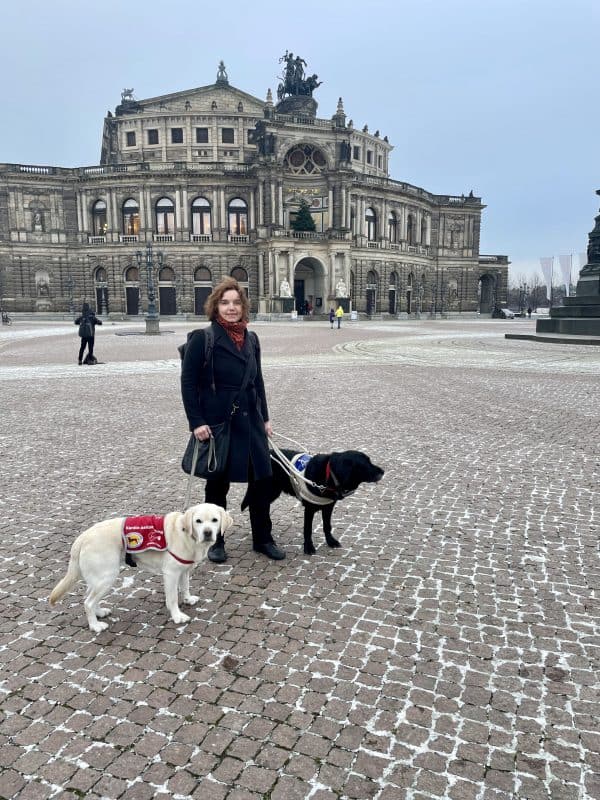
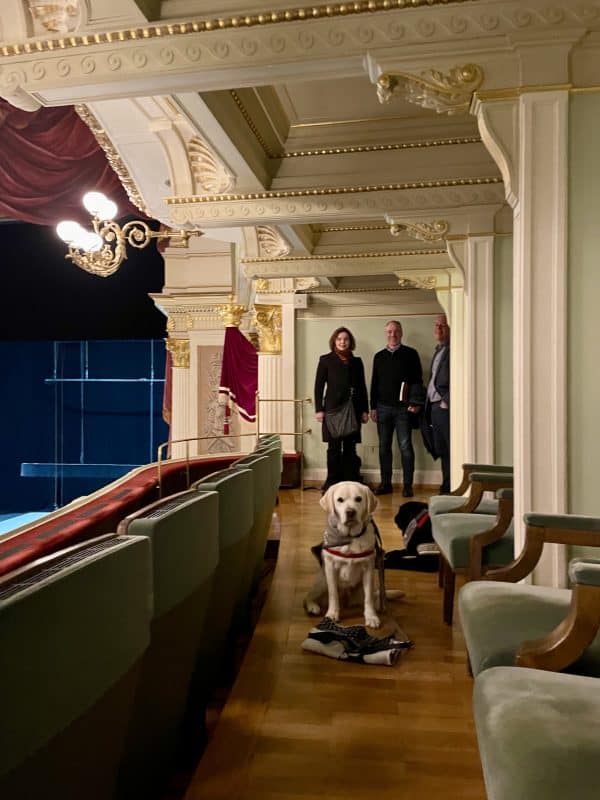
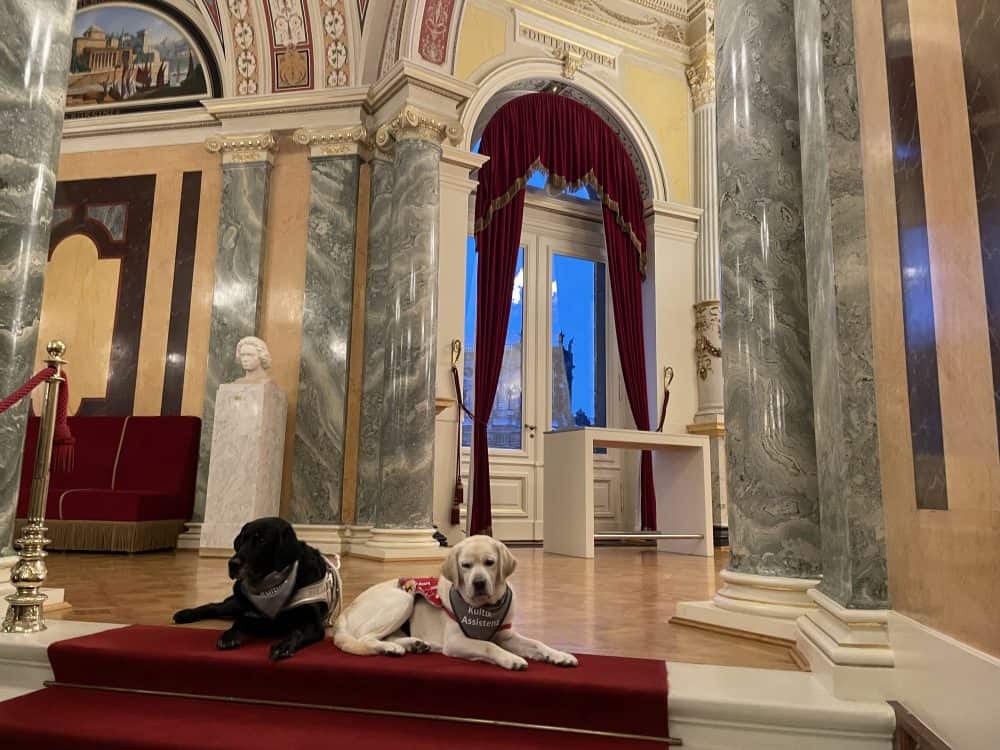
The next morning we have an appointment at the military history museum. We are greeted by a breathtaking building and as soon as we walk through the door, we are greeted by Mrs. Snow. We talk for a long time about assistance dogs and how to recognize them, about operational injuries to members of the military and the help provided by assistance dogs and the challenges of making museums accessible. It’s a good conversation. We want to learn from each other where the difficulties and ideas for solutions are seen. Later, a film crew joins us. What do we particularly remember? We thought we were now pros at giving interviews, and then the question came so unexpectedly that our voices broke and our eyes grew moist, because the answer immediately brought home the finite nature of our time together. “What does your assistance dog mean to you?”
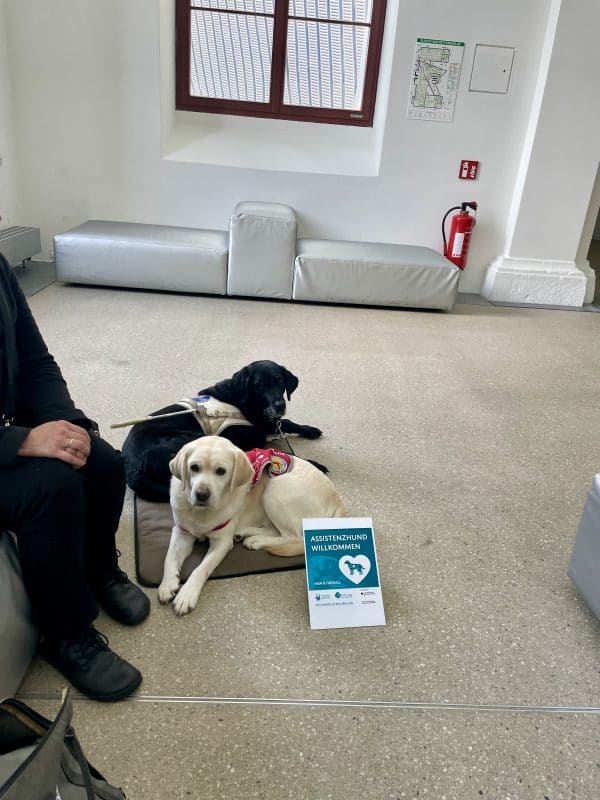
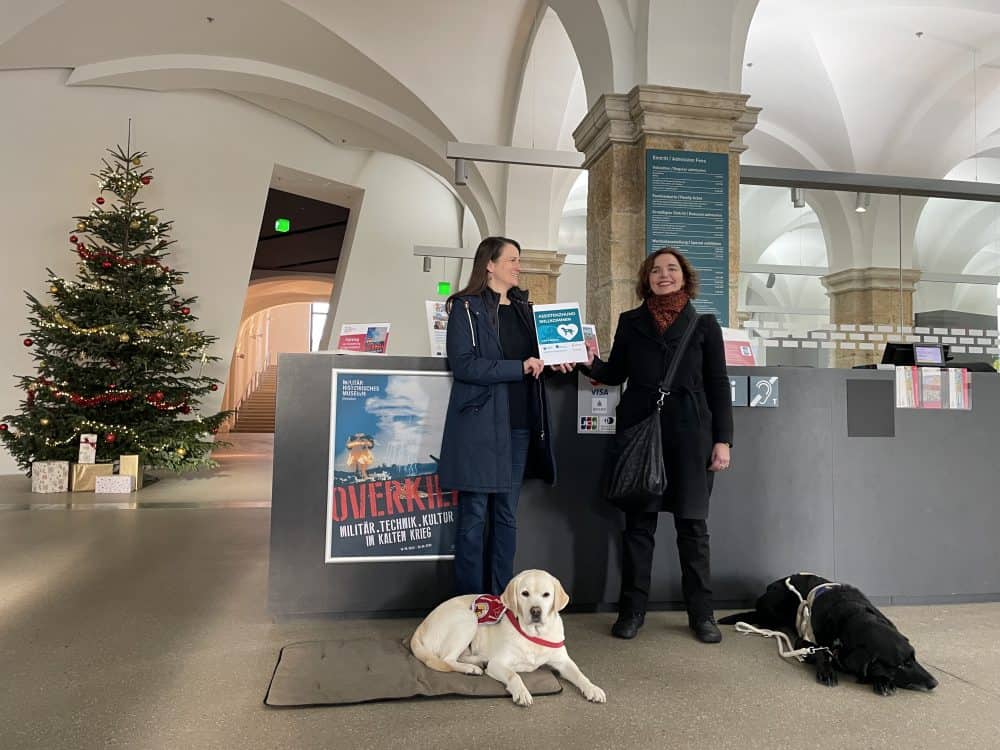
We let the dogs run around and take a deep breath. It is already dark when we have an appointment with the head of the health department at the town hall. We talk for a long time, we struggle to find solutions and walk wearily from the now quiet town hall to the car. Sometimes solutions take time. This is not the first time we have doubted the law. Without restrictions on access refusals, it is a toothless tiger. No, we don’t want to be frustrated. Sometimes solutions take time.
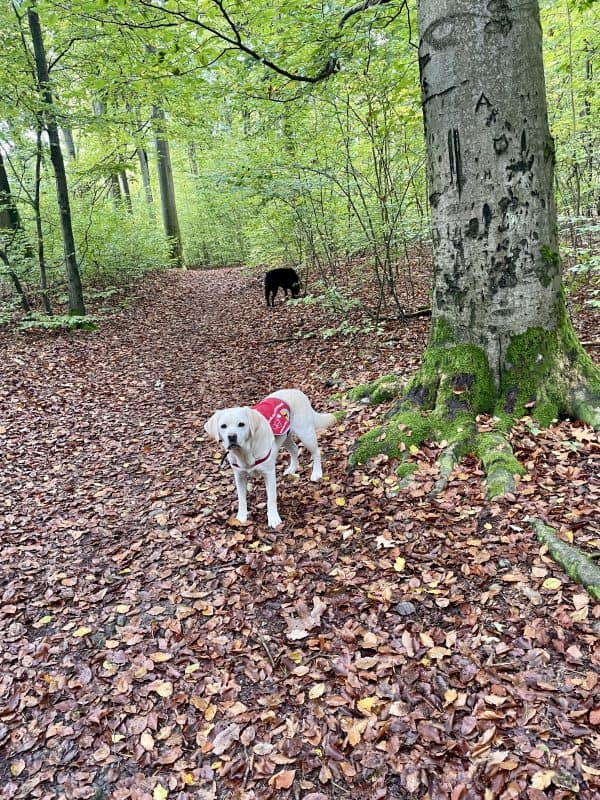
The city administration of Dresden officially welcomes assistance dogs in its facilities. This can be recognized by the door sticker “Assistance dog welcome”, which is available at the Leuben Citizens’ Office, for example. This first sticker was affixed today, Monday, October 23, 2023, by Manuela Scharf, Commissioner for People with Disabilities and Senior Citizens, and Kristina Löscher, Head of the Citizens’ Office, together with Pfotenpiloten ambassadors Dr. Hannah Reuter and Manja Maserati.
Read more here: https://www.dresden.de/de/rathaus/aktuelles/pressemitteilungen/2023/10/pm_051.php
On October 23, 2023, we placed the first “Assistance dogs welcome” sticker in our Leuben district in Dresden. The start has been made and I look forward to all further appointments with the Pfotenpiloten. The legal improvements to the carrying of assistance dogs need to be much better known than they are now, and the project contributes to this. We are very happy to participate and stay tuned.
Manuela Scharf, Commissioner for People with Disabilities and Senior Citizens, City of Dresden
The “Assistance dog-friendly municipality” campaign was made possible by funding from the Federal Ministry of Labor and Social Affairs (BMAS) and Aktion Mensch.
@Aktion Mensch, #AktionMenschGefördert, #AssistenzhundWillkommen, #1BarriereWeniger, #OrteFürAlle #Barrierefreiheit. #Inclusion, #assistance dog



